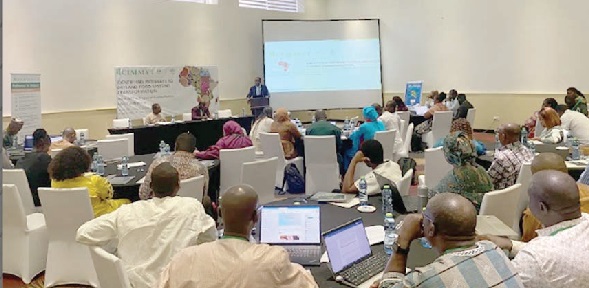
Adopt dryland resilient crops to address food security — Scientists
Adopting dryland resilient crops in West Africa is crucial for addressing food security in the region, scientists have said.
They believe by enhancing agricultural practices and adopting crops such as millet, sorghum and legumes, communities can become more resilient to climate change and ensure a stable food supply for the growing population.
Furthermore, the adoption of dry land crops would serve as a buffer against inflation by ensuring a more consistent and reliable food supply.
Also, by lessening the vulnerability of crops to climate-related shocks, communities can better withstand price fluctuations caused by shortages in staple foods.
Speaking at the opening of a three-day West Africa Regional conference in Accra, an Agricultural Economist and Scientist at the International Maize and Wheat
Improvement Centre (CIMMYT), Dr Paswel Marenya, said dryland crops have evolved to thrive in harsh conditions, enabling them to be well-suited for the challenging environments found in West Africa’s drylands.
He said by adopting and promoting the cultivation of these crops, the region can enhance local food sovereignty, reduce dependence on external aid and contribute to the resilience of agriculture systems in Africa’s drylands.
“About 45% of Africa's landmarks are dry lands and about 520 million people live in areas that are characterised as drylands; that's half of Africa. Africa is about 1.2 billion, with over 500 million people living in the drylands, nearly half the world's population is in this continent.
If you look at Food and Agriculture Organisation (FAO) statistics, food insecurity is rampant across the dry lands of the Sahel, East Africa. So it's a pervasive problem; high levels of food insecurity and poverty as well,” Dr Marenya said.
Conference
Organised by the Council for Scientific and Industrial Research – Savanna Agricultural Research Institute (CSIR-SARI) in partnership with the International Maize and Wheat Improvement Centre (CIMMYT), the conference was on the theme “Identifying Pathways to Dryland Food Systems Transformation.”
It brought together scientists and experts from Ghana, Nigeria, Senegal, Burkina Faso and Mali to provide valuable feedback on the "Pathways to Impact Dryland Crops in
Africa" Report, aiming to foster discussions on strategic and operational scaling innovations.
Participants engaged in rigorous dialogue to align efforts and strategies towards sustainable food security and agricultural development in the drylands of West Africa.
By leveraging collective expertise and experiences, the conference aimed to address challenges that have hindered the success of past dryland legumes and cereals (DLC) programmes.
Limited adoption
For his part, the Director for CSIR-SARI, Dr Francis Kusi, said despite decades of investment by the Consultative Group on International Agricultural Research (CGIAR) and the National Agricultural Research System (NARS), system in crop improvement and natural resource management in dryland agriculture systems, agricultural and human development levels in these dryland areas remain low.
This, he said, was partly due to limited adoption of improved dryland crops and low yields.
Dr Kusi explained that challenges such as poor integration of social science in variety development result in crop varieties that do not meet farmer or market needs, and inadequate data collection and analysis for on-farm performance, leading to varieties unsuitable for local conditions.
He also mentioned weak scaling strategies causing inconsistent availability of improved seeds, lack of market awareness in releasing new varieties resulting in misalignment with market demands, and resource constraints in national seed programmes impeding sustainable variety development and dissemination.
These factors, he said, collectively hinder the transition from traditional seeds to more productive new varieties among farmers.
“Following these discussions, the Programme's socio-economics team refined the initial impact pathway ideas into more focused strategies.
These strategies are now set to be priorities for the dryland crops programme and include a proposed innovative seed delivery model,” he said.
He said the next step involved detailed discussions with national teams to scrutinise, enhance and adapt these strategies and the innovative seed delivery model.
“This consultation process aims to transform these initial ideas and models into a widely accepted set of principles. The final, agreed-upon outcomes from these consultations will direct research and development efforts, ensuring the long-term impact of dryland crops,” he added.
